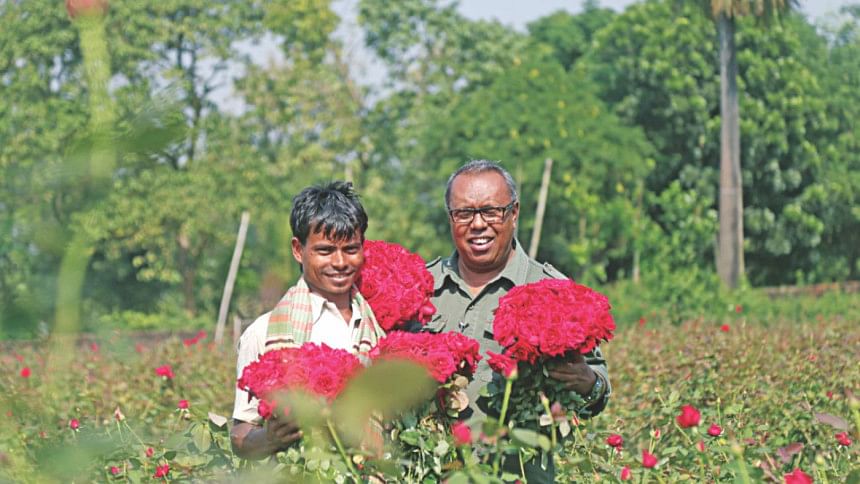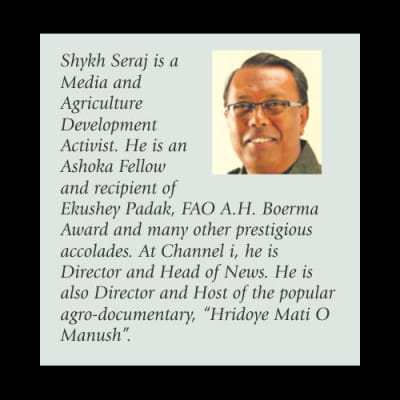Tale of Savar's rose villages

Many years back, I read in the Greek mythology, when Aphrodite was born, as a symbol of holiness and purity her whole body was covered with white roses. Later, her lover Adonis' blood made the colours of roses, red. Since then, the symbol of love has been circling around the colour of red. And Shakespeare also wrote in his play, 'Romeo and Juliet', “What's in a name? That which we call a rose by any other name would smell as sweet.” Roses are not just the emblem of love. They are also a blessing. Worldwide the roses have varied use. The rose is used to express many different thoughts in Persia, China and rosewater is used in the Indian subcontinent since ancient period. It's not only a flavour for a perfume, there are rose oils too. I searched the internet to take a closer look on diverse benefits of this flower and found, that even the rose-tea is very beneficial for human health. It is also used for curing ulcer, asthma, dehydration - truly mind-blowing facts!
This very flower is changing the scenario of Bangladesh. Hridoye Mati O Manush (Soil and People in Heart) has already aired several episodes on roses, over the years. It's true that flower of abundant prospect is changing the fate of farmers and state of farming. Very near to Dhaka, in Savar, many villages have turned around very positively. The area is referred to as 'The village of roses'. But there are always the thorns that are hurting the farmers. The wounds often get bigger than expected. Let's share some past stories before coming to the story of obstacles and oppression faced by the rose farmers.

It was the beginning of the 80s, to be specific, around 1983, Sher Ali Sarder from Panisara village in Jessore's Jhikorgachha upazila started growing tuberose on 30 decimals of his own land. You may say, that was the first ever commercial venture of flower farming in the country. It all started from there. Now, Godkhali of Jessore is termed as the 'flower capital' of Bangladesh. I hope you still remember the early 2013 events when I took former US ambassador to Bangladesh Dan Mozena to Godkhali. Afterwards, many developmental works have been done to upgrade the flower trading system and for the rose farmers.
In 25 districts of the country, on around 6,000 hectares of land, flowers are cultivated. During the past more than three decades of time, the flower business boomed like anything. For further information, around 20,000 flower farmers are now engaged. More than three million people seek their livelihood from the flowers. The flower market in the country is worth an outstanding Tk 1,000 crore approximately. However, due to many other hindrances, we couldn't enter the international market the way we expected, considering the huge promise of the sector. On the other hand, 20 billion dollar flower market is already under the belts of Japan, India, Malaysia, Sri Lanka, Thailand, Singapore and some European countries. The market and money go on expanding and increasing.
When flower farming first started in Savar back at the end of the 90s, I went there a number of times to make episodes for BTV's (Bangladesh Television) Mati O Manush. Many years later, I felt like going there again, as I was hearing great success stories in some of the villages there. And, farmers had other things as well to share with me. The 'village of roses' was absolutely looking red the dew over the buds was sparkling when the sun fell over it in the early morning. It was an astounding imagery. The red landscape of rose took my mind back to Keukenhof, the most beautiful spring garden of the world, located in Netherlands' Lisse area. It was May, 2015.
Keukenhof is the international and independent showcase for the Dutch floriculture sector, with a special emphasis on flower bulbs and also shows what the Dutch floriculture sector has to offer. The park focuses on the 7 million spring-flowering bulbs, which allow the 100 participating companies to show their living catalogue. 500 flower growers present an enormous variety of cut flowers and pot plants at 20 flower shows. Most importantly, Keukenhof is an excellent opportunity to network and meet business contacts. It also has strong ties with all the relevant organizations in the floricultural and tourist sector. I wish one day, our flower farmers will showcase what they've got since it's a great opportunity for networking and meeting business contacts. I also went there to a selfie garden, made fully of flowers. And the flowers made the portrait of a historic Post-Impressionist Dutch painter, Vincent Willem van Gogh. Truly, everything seemed so much in order from different perspectives, from traders to growers and to adults and kids.
Let's come back to the village of roses. Agriculture here is focused on farming flowers. All the villages of three unions in Savar -- Shyampur, Bongaon and Birulia -- have turned into villages of roses. Flower farming revolution started here 24 years back. Only a few changemakers showed the path and in course of time, others followed and gained commercial success to reach the apex. Now they earn threefold profit from one bigha of land, leaving other crops. Most of the profit comes from the roses and it's almost certain that the profit will come. Consequently, rose is the bread and butter for many locals here.
The scenes I have witnessed thus far over a long period of time have changed dramatically. And, here in the rose villages, the flower market starts in the afternoon. The wholesalers come and take what they need. Life has become easier for these people. At a tea stall near the flower field of Sadullah village, some farmers brought an issue to the table. They complained that the paper flowers, which are still being imported, are dashing their hopes. They could have achieved even more, contributing to the national economy, they say. The authorities concerned of the government will certainly put their thoughts here, I'm sure.
“We don't get any support from the banks. We get SME loans but not agriculture loans,” said a young flower farmer Russell.
It's evident that these farmers have proven their success and if they could get the agriculture credit facility, it would become even bigger and certainly better and more new entrepreneurs would feel comfortable to join the flower farming.
There is also the risk of occupational hazard. Farmer Bappee works with bare hands and thorns have injured his hands but he's so superstitious that he won't wear a pair of gloves upon my request. I felt a little disappointed as I talked about this so many times on TV and wrote in newspapers, emphasising how important it is to secure the health of our farmers. I am sure the government authorities will look after the health issue of farmers, especially how they can mitigate the issue of occupational hazard.
Dear readers, another important fact that I wanted to share with you. This Savar area is affected with the oppression from the land grabbers; sometimes they are called land sharks. They take lease of farmlands but use it for industrial or other purposes. Farmers took me to an area encircled with barbed wire fence. It's a protected area. I talked with many other farmers and the crisis finally was revealed.
“These people are working to construct buildings for different purposes; they're not going to use it for us,” said Anwar Hossain, a rose farmer for fifteen years in Savar. So, the arable lands are given on lease for construction! Those who are involved in the construction process are bold enough to say they've taken the lands on legal lease. These lands were for farming, claim the farmers. But why were these people threatened or their places burned and then the barbed wire came into play? I was really shocked to witness something; something really weird. A land has a red-clothed sign on a bamboo. Farmers say, this is a danger sign. On this very land, the owner can never come for work. This is horrible. The red sign only meant this land will also be grabbed by the influential people in the name of lease. Lands of many farmers have already been grabbed. They invested but couldn't reap the profit and now they are hapless. Those who have taken the lease say they have legally taken it from Land Reforms Board, but the locals say only the deputy commissioner (DC) has the authority to give these lands on lease. However, the DC was not at all aware of this predicament.
Dear readers, these lands are already being used for non-farming sectors. The rise of rose farming will be at full stop if this keeps on happening. In Savar, on around 400 hectares of land, flower is cultivated. On over 350 hectares of land, only roses are cultivated. Many farmers' dream, passion and labour are behind this development. Thousands of farmers in the Savar region cherish a bigger dream of growing flowers and become financially solvent. If we can't stop the land sharks now, the dreams of these people will be shattered. The passion will be damped. The energy will be lost. I am confident that government will give proper attention and monitor the situation immediately for the revival of the dreams of many and ensure the commercial progress of rose farming in the region. Advance greetings of New Year to all the farmers and my valued readers.

 For all latest news, follow The Daily Star's Google News channel.
For all latest news, follow The Daily Star's Google News channel. 




Comments